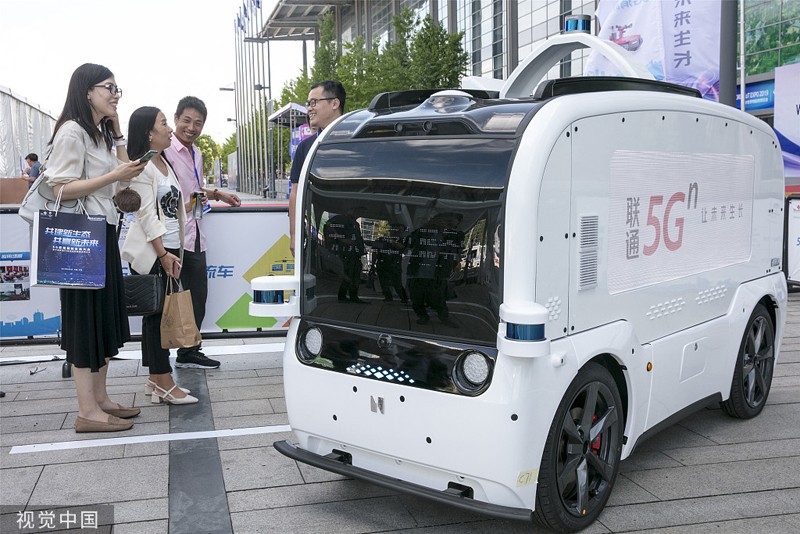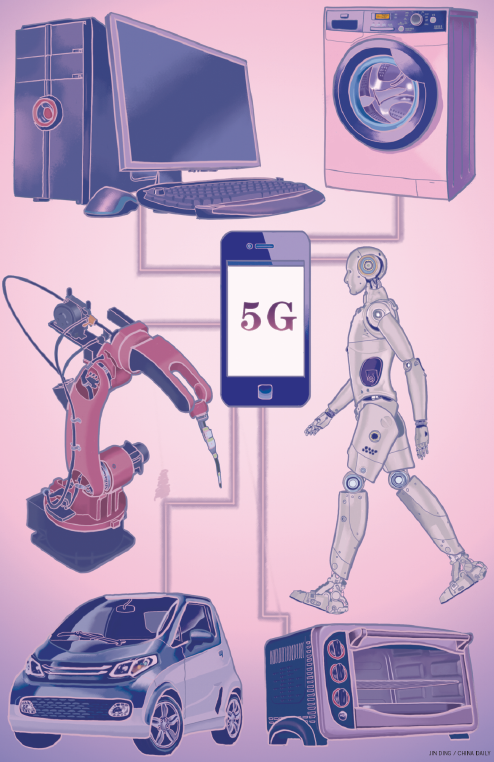A transformative high-tech combo
By Cheng Yu in Wuxi, Jiangsu province | China Daily | Updated: 2019-10-14 09:09

Such efforts will put China in the driver's seat with respect to the adoption and use of IoT technology, he said. By 2022, China is expected to spend $300 billion annually on IoT and surpass the United States as the world's largest IoT market, said a report from market consultancy IDC.
Last month, the Ministry of Industry and Information Technology unveiled a guideline, which urged efforts to accelerate the IoT development and deepen the integration of informatization with industrialization.
"China is opening a new window on the development of large-scale IoT and also creating an opportune period for related parties to map out and gain a lead in the field," said Wang Zhijun, vice-minister of the Ministry of Industry and Information Technology.
Wang said the ministry will ramp up efforts in nurturing sectors such as the industrial internet and will help link needs with the demand to drive commercialization of IoT.
Accenture said in a report that IoT promotion will bring new opportunities to the manufacturing sector. It will greatly boost the sector's management and efficiency. It will also facilitate the transformation of traditional manufacturing industries.
The industrial internet, for instance, has witnessed rapid development in the past few years, and the assembly and production lines have started to take root in the country.
"Accelerated steps on the industrial internet are of significance to China's advanced manufacturing amid fierce competition from abroad," said Yang Chunli, a researcher at the China Center for Information Industry Development, a Beijing-based think tank.
The MIIT estimated there are more than 50 industrial internet platforms with regional or sector-wide influence in the country. Also, an increasing number of applications are being commercialized with each platform owning 1,500 apps on average.
Many existing Chinese companies have already beefed up their presence and gained momentum in the industrial internet segment, with improved efficiency and management via introduction of new technologies in the assembly lines.
For instance, SAIC Maxus Automotive Co, a subsidiary of carmaker SAIC Motor Co, allows customers to customize vehicles on their platforms with the help of the industrial internet.
Wang Rui, vice-president of SAIC Maxus, said the company's compound annual growth rate has risen by over 60 percent because of the platform, despite the overall downturn in the global vehicle industry.
CosmoPlat, another industrial internet platform widely considered a global leader in smart manufacturing, is playing an important role in large-scale customization of the manufacturing sector.
The platform, developed by Chinese home appliance giant Haier Group, allows the industrial internet to engage in every step of manufacturing, from design to sales.
In addition to making Haier's own factories more flexible, the company said at the Wuxi conference that the industrial internet system is empowering companies by bringing them closer to consumers and suppliers.
Data showed the platform has attracted 320 million users and 3.9 million enterprises covering electronics, textiles, equipment, construction, transportation and chemical engineering.
Though 5G has given an edge to China in IoT development, Zou Debao, a senior analyst from CCID Consulting, which is part of the MIIT, said large-scale commercialization of IoT needs more efforts and does not depend only on 5G.
"It is not fair to say that the commercialization of 5G network can bring real economic benefits to the large-scale use of IoT," Zou said, adding that it acts like a supporting role rather than a decisive one.
To enable large-scale IoT applications, more accelerated efforts are needed to develop independent upstream sensors and apply them soon in the sector, Zou noted. "In addition, the IoT industry also requires concerted efforts of telecom carriers and product suppliers to promote it."

























